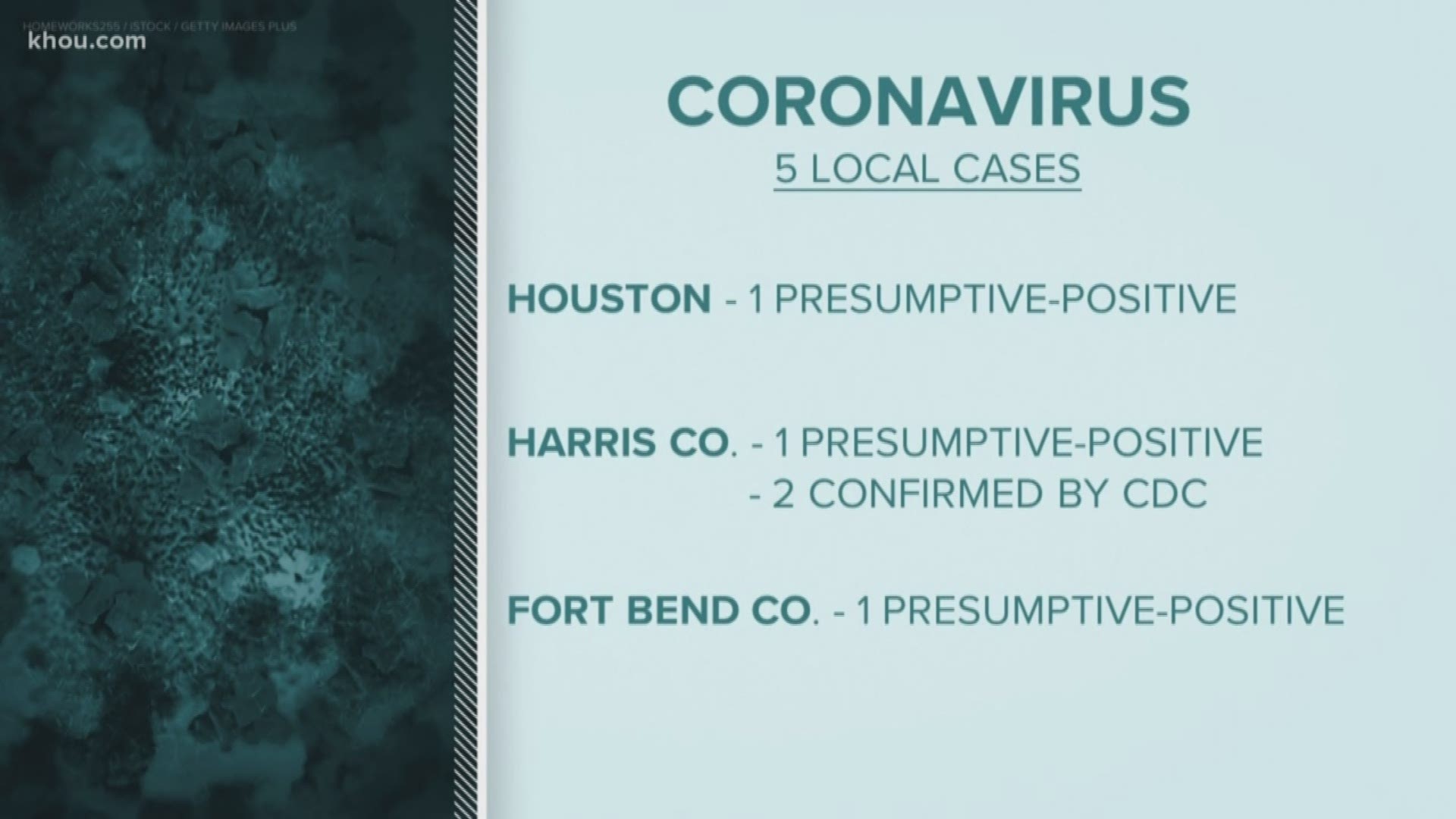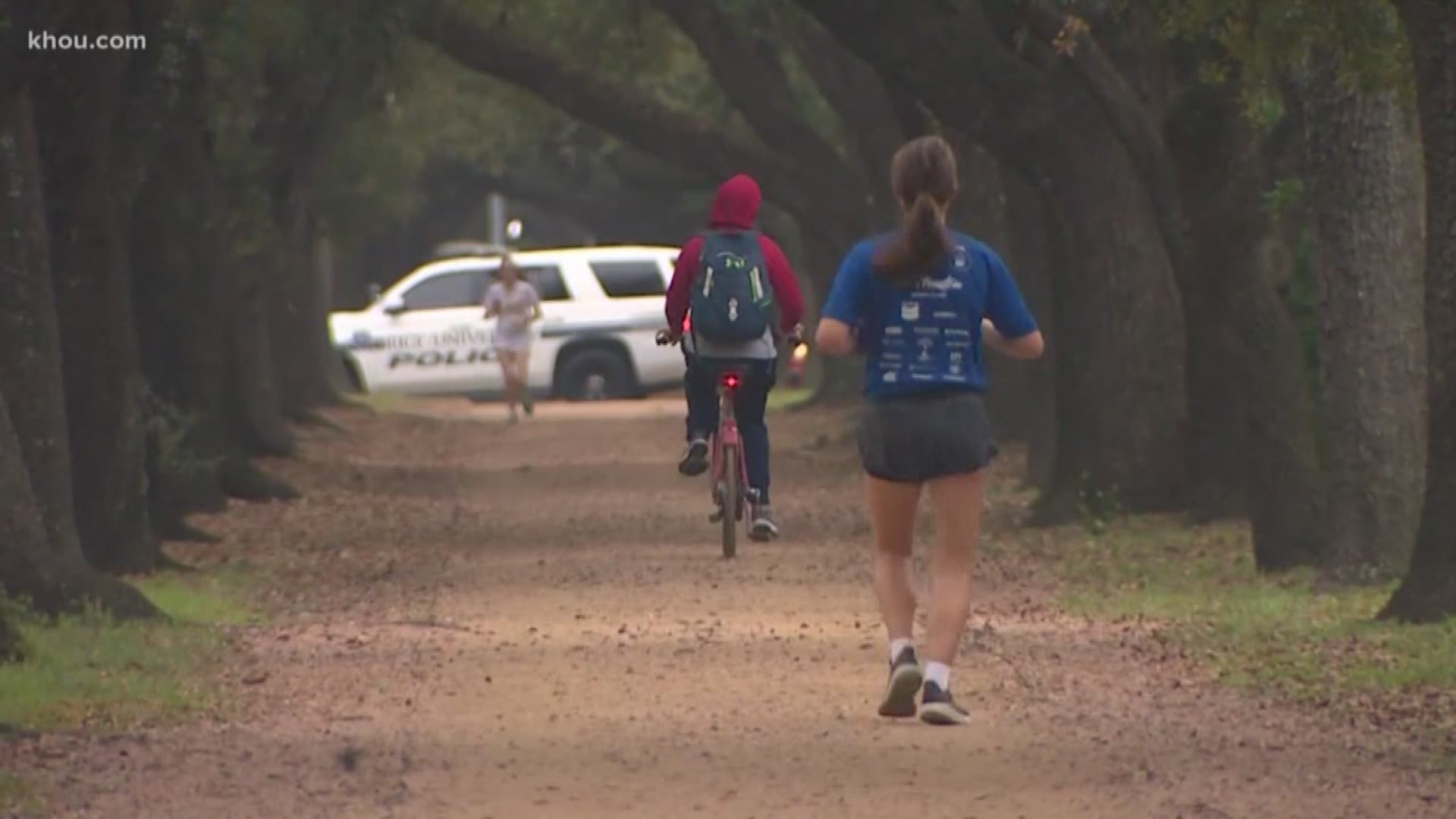HARRIS COUNTY, Texas — Six patients who are being treated for the coronavirus in the Houston area all traveled together to Egypt last month.
City of Houston
- Woman, age 60 to 70; traveled to Egypt last month; positive
- Man, age 60 to 70; traveled to Egypt last month; presumptive positive
Harris County
- Woman from NW Harris County; age 60 to 70; works at Rice; traveled to Egypt; positive
- Man from NW Harris County; age 60 to 70; traveled to Egypt; positive
- Man from NW Harris County; age 60 to 70; traveled to Egypt; presumptive positive.
Fort Bend County
Stafford man; 70 years old; traveled to Egypt; presumptive positive.
The three presumptive positive cases are waiting for final results from the CDC.
"All the cases in the Houston area have international travel in common and we've been actively monitoring these individuals since they were identified as being at-risk," Houston Mayor Sylvester Turner said. "I encourage Houstonians to limit international travel for the time being and heed the advice of public health officials about healthy hygiene habits. If you are feeling sick, stay at home. But do not be paralyzed by fear."
Harris County Judge Lina Hidalgo said in a news conference on Thursday that the county treated everyone associated with the trip as presumptive positives.
Hidalgo said the county is in containment mode, mapping the network of people who may have come in contact with those who tested positive for the coronavirus.
More positive cases are expected to be announced in the coming days, according to Hidalgo.
Hidalgo said the Harris County Office of Emergency Management is currently operating at a Level 3. County officials have been running exercises and organizing plans for how to respond to more positive coronavirus cases. The county is working closely with the hospital system and school districts in order to properly respond to the situation.
Hidalgo said the next level of concern would be discovering cases that can't be traced. She said all of the current cases are travel-related and all are explainable. She said there is no proof of community contagion and there's no proof the virus was contracted on United States soil.
For the latest coronavirus headlines text "FACTS" to (713) 526-1111.
The woman who tested positive in Harris County is a Rice University employee.
Rice University said in a statement on Thursday that no other doctoral students, faculty or staff members who are currently in self-quarantine have reported coronavirus symptoms. The employee's contact with the Rice campus happened on Feb. 24 and 25. The affected employee's "presence on campus was limited to one building, which has been extensively and continuously sanitized along with the rest of the campus," the university said.
Rice said the employee didn't have direct contact with the undergraduate population and hasn't been in any "residential colleges or classrooms since returning to Houston Feb. 20."
There is no plan to suspend campus operations or classes.
Coronavirus cases
Here is a breakdown of the cases in the Houston area:
Houston
- 1 presumptive positive
Harris County
- 1 presumptive positive
- 2 confirmed by the CDC
Fort Bend County
- 1 presumptive positive
Coronavirus symptoms
The symptoms of coronavirus are similar to the flu or a bad cold. Symptoms include a fever, cough and shortness of breath, according to the Centers for Disease Control.
Most healthy people will have mild symptoms. A study of more than 72,000 patients by the Centers for Disease Control in China showed 80-percent of the cases there were mild.
But infections can cause pneumonia, severe acute respiratory syndrome, kidney failure and even death, according to the World Health Organization. Older people with underlying health conditions are most at risk.
The CDC believes symptoms may appear anywhere from two to 14 days after being exposed.
SPECIAL COVERAGE: Stay up to date on coronavirus
How coronavirus is spread
Human coronaviruses are usually spread through:
- The air by coughing or sneezing
- Close personal contact, such as touching or shaking hands
- Touching an object or surface with the virus on it, then touching your mouth, nose or eyes before washing your hands.
Help stop the spread of coronavirus
- Stay home when you are sick.
- Eat and sleep separately from your family members
- Use different utensils and dishes
- Cover your cough or sneeze with your arm, hot your hand.
- If you use a tissue, throw it in the trash.
Lower your risk
- Wash your hands often with soap and water for at least 20 seconds. If soap and water are not available, use an alcohol-based hand sanitizer.
- Avoid touching your eyes, nose, and mouth with unwashed hands.
- Avoid close contact with people who are sick.
- Clean and disinfect frequently touched objects and surfaces.
- If you are 60 or over and have an underlying health condition such as cardiovascular disease, diabetes or respiratory illnesses like asthma or COPD, the World Health Organization advises you to try to avoid crowds or places where you might interact with people who are sick.


